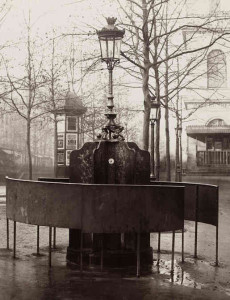
In the 1870s, Paris police and civic leaders railed against what they considered a significant problem: men soliciting sex from other men at public urinals.
Consensual homosexuality was not illegal in France (it was decriminalised during the Revolution) but public displays of homosexual behaviour were nevertheless prosecuted as “offences against public decency”. Between 1870 and 1872, more than 100 men were arrested for loitering or acting suspiciously around street toilets in Paris. In 1876, police even found Count Eugene de Germiny, a conservative member of the city council, in a lavatory clinch with a young man named Pierre.
After de Germiny’s arrest, the concern about nefarious activities in public toilets reached fever pitch. One Paris physician, Maurice Laugier, attempted to penetrate the hysteria with an 1878 essay titled Du role de l’expertise médico-légale dans certains cas d’outrage public a la pudeur (“The role of forensic evidence in certain cases of outraging public decency”).
Dr Laugier described several cases where men with verifiable medical conditions were unfairly dealt with by police, including one man:
“…suffering from a urinary tract infection… who was observed and questioned by the police [for his] very prolonged stay in a urinal and the manoeuvres that he was exercising on his penis.”
Men suspected of dubious activity in or around public toilets, wrote Laugier, should be questioned about their medical history and afforded a full medical examination before being charged or presented for trial.
Source: Dr Maurice Laugier, “Du role de l’expertise medico-legale dans certains cas d’outrage public a la pudeur” in Annales d’hygiene Publique et Medecine Legal, 1878. Content on this page is © Alpha History 2019-23. Content may not be republished without our express permission. For more information please refer to our Terms of Use or contact Alpha History.
